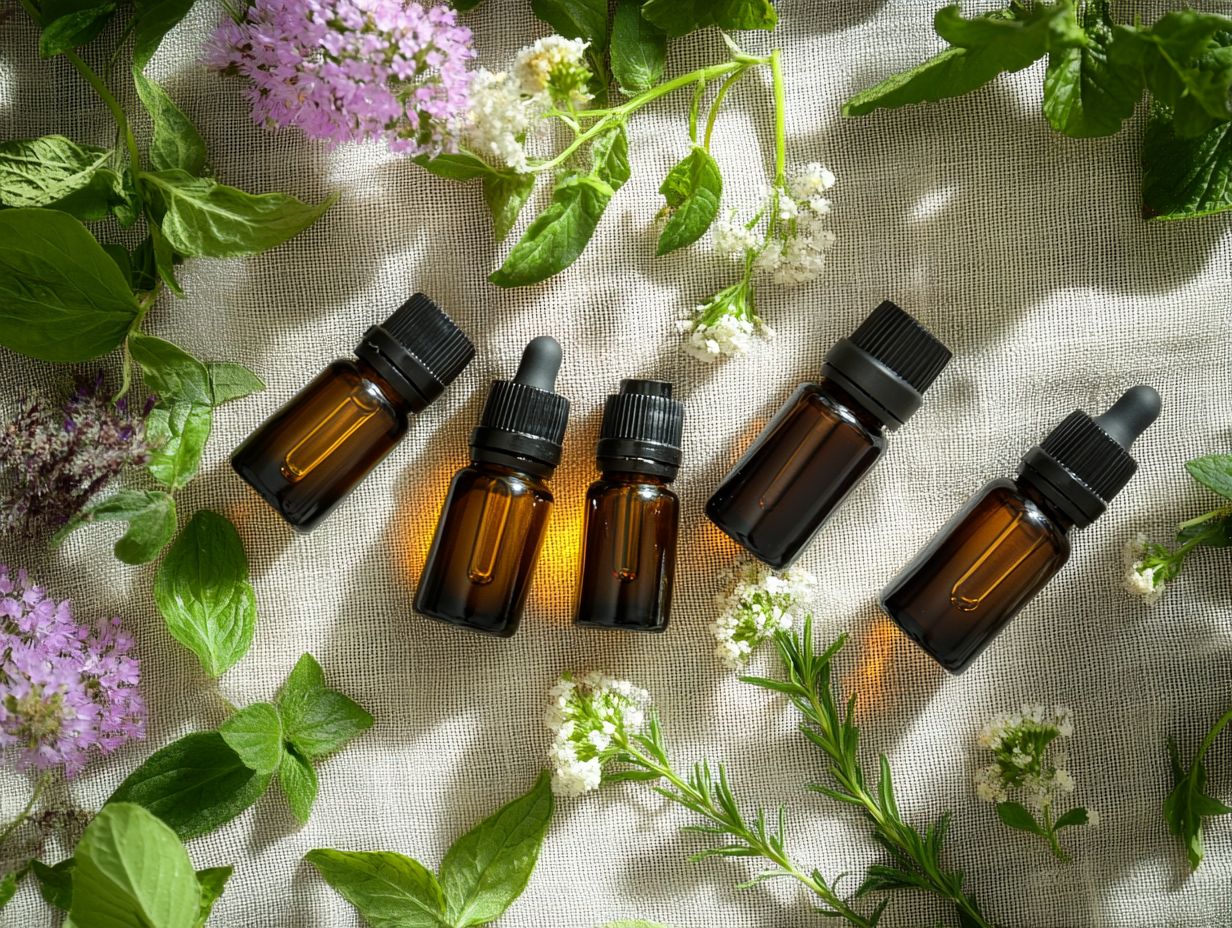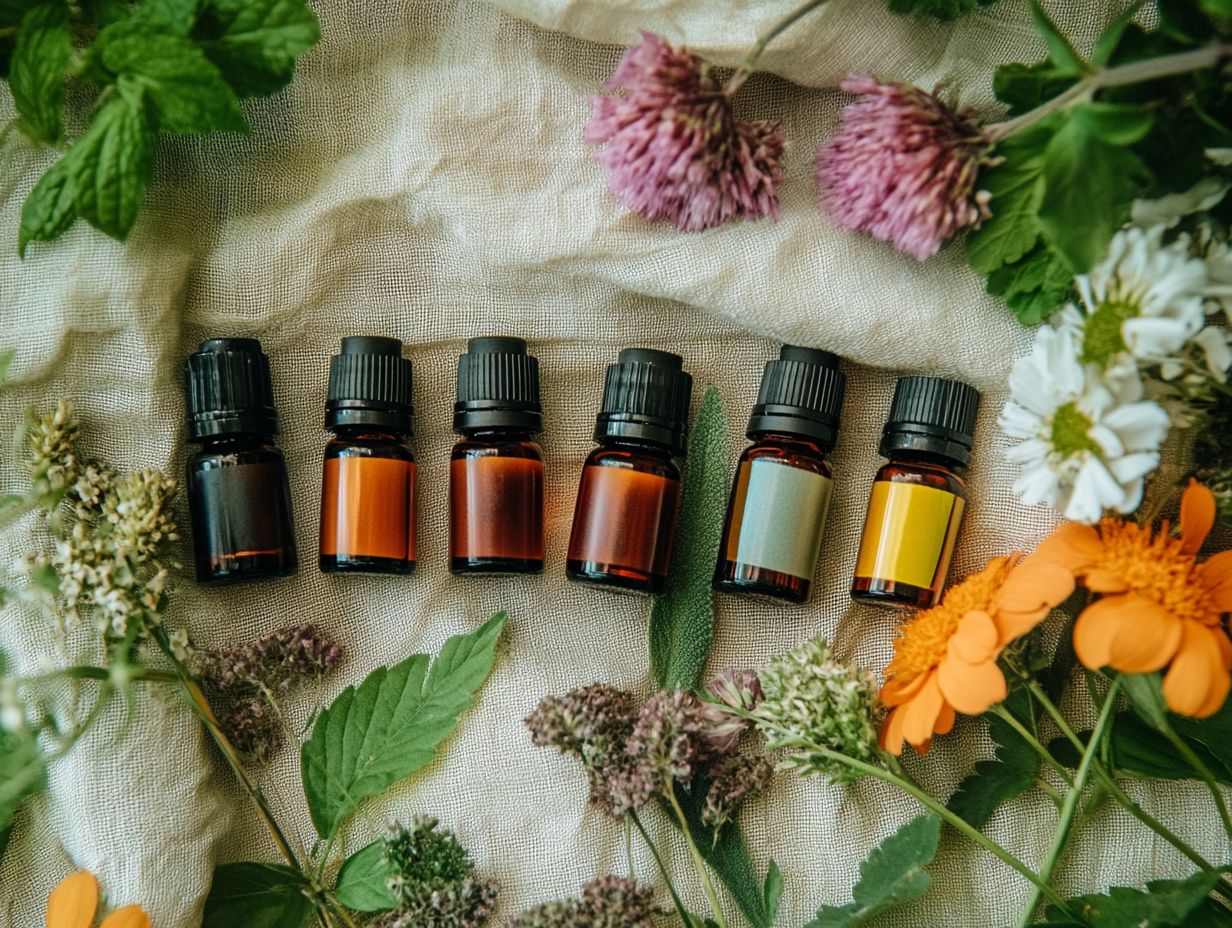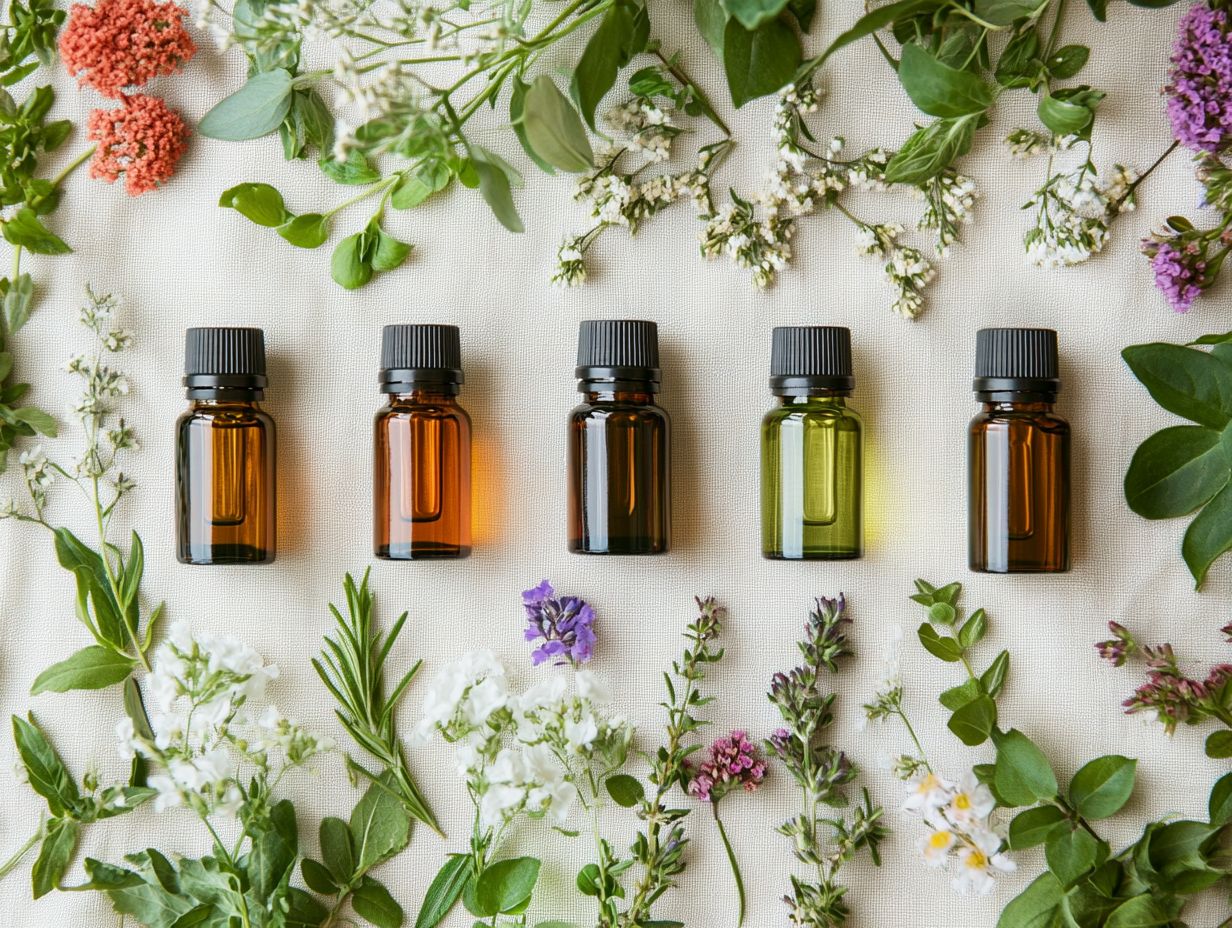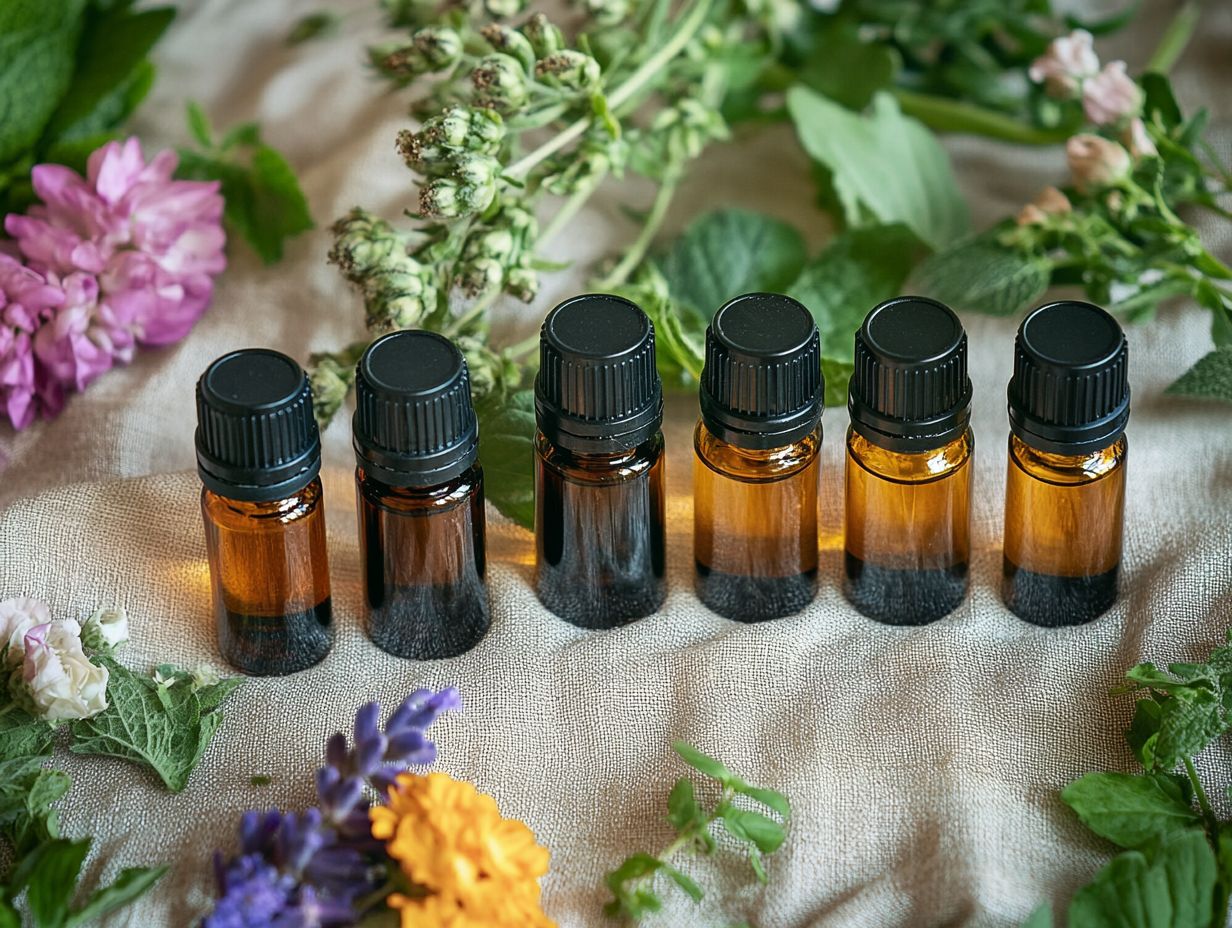62. 5 Essential Oils for Integrative Health Benefits
Essential oils have surged in popularity for their myriad health benefits, providing a holistic approach to wellness that effortlessly fits into your daily life. Explore these oils today to unlock their powerful benefits for your health!
This article delves into five potent essential oils Lavender, Peppermint, Tea Tree, Eucalyptus, and Lemon each with unique properties and applications.
Far more than just delightful fragrances, these oils can sharpen mental clarity, bolster physical health, and nurture emotional well-being.
Discover how to seamlessly weave these oils into your wellness routine, complete with safety tips and recommended blends to enhance their benefits.
Contents
- Key Takeaways:
- Unlock the Power of Lavender Oil
- Refresh with Peppermint Oil
- Transform with Tea Tree Oil
- 4. Eucalyptus Oil
- 5. Lemon Oil
- 6. How Do Essential Oils Work?
- What Are the Different Ways to Use Essential Oils?
- What Are the Safety Precautions When Using Essential Oils?
- What Are the Benefits of Essential Oils for Health?
- How Can Essential Oils Be Incorporated into a Wellness Routine?
- What Are Some Common Essential Oil Blends for Specific Health Benefits?
- What Are Some Natural Remedies Using Essential Oils?
- How Can Essential Oils Be Used for Mental Health and Emotional Well-Being?
- What Are Some Essential Oils That Should Be Avoided for Certain Conditions?
- What Are the Potential Side Effects of Using Essential Oils?
- How Can One Choose High-Quality Essential Oils?
- What Are Some Other Uses for Essential Oils Besides Health Benefits?
- How Can Essential Oils Be Used in Combination with Traditional Medicine?
- What Are Some Resources for Learning More about Essential Oils and Their Uses?
- Frequently Asked Questions
- What are essential oils and how can they benefit my health?
- What are the 5 most essential oils for integrative health benefits?
- How can lavender essential oil benefit my health?
- What are the benefits of peppermint essential oil?
- How can tea tree essential oil support my health?
- What are the uses of eucalyptus essential oil?
- Can lemon essential oil benefit my health?
Key Takeaways:

- Lavender oil promotes relaxation and can improve sleep quality.
- Peppermint oil can help alleviate headaches and improve digestion.
- Tea tree oil has antiseptic properties and can be used for skin issues.
Unlock the Power of Lavender Oil
Lavender oil stands out as one of the most revered essential oils, celebrated for its calming effects and a plethora of health benefits. Its reputation has earned it a prominent place in aromatherapy and complementary medicine.
With therapeutic properties that can elevate your mood and alleviate stress, lavender oil has become a cornerstone of holistic care practices. Not only does it offer a sensory experience that calms the mind, but it also positively impacts emotional well-being and cognitive function.
The extraction process of lavender oil typically employs steam distillation, a method that meticulously preserves the intricate balance of its chemical compounds, such as linalool and linalyl acetate. These compounds are key to its enchanting aroma and therapeutic benefits.
As a holistic remedy, lavender oil is widely cherished for its ability to reduce anxiety and promote restful sleep, making it a go-to choice for those seeking natural alternatives to conventional sleep aids.
Lavender oil has potential anti-inflammatory and antimicrobial properties, rendering it a versatile option for skincare and wellness. Many users discover that incorporating this essential oil into their daily routines enhances relaxation and supports their overall health.
Refresh with Peppermint Oil
Peppermint oil is a versatile essential oil that you will find both refreshing and beneficial for your health, particularly regarding digestive and respiratory wellness.
Packed with active ingredients, this oil can enhance cognitive function, relieve headaches, and provide an invigorating sensory experience that awakens both mind and body.
The extraction process typically involves steam distillation of peppermint leaves, capturing the essence of its active components, including menthol and menthone. These compounds not only contribute to the oil’s uplifting aroma but also enhance its powerful medicinal properties.
In aromatherapy, you can diffuse peppermint oil to boost mental clarity or blend it with carrier oils for topical applications that soothe sore muscles.
It can be seamlessly integrated into your culinary adventures, whether in foods or teas. Some studies even suggest that its compounds may exhibit anti-cancer properties, making peppermint oil a remarkable addition to your wellness routine and a delightful enhancement to your culinary creations.
Transform with Tea Tree Oil
Tea tree oil, derived from the Melaleuca alternifolia plant, is celebrated for its remarkable antimicrobial properties and diverse applications in natural remedies.
This essential oil stands out for its effectiveness in treating various skin conditions, making it a favored choice for those who prefer plant-based solutions for everyday health issues.
Thanks to its ability to combat acne-causing bacteria and reduce inflammation, you may find it to be a transformative addition to your skincare routine.
Its antifungal properties also position it as a reliable treatment for fungal infections, such as athlete’s foot and ringworm.
When applying tea tree oil to your skin, it s essential to dilute it with a carrier oil, like jojoba or coconut oil, to prevent irritation.
By taking safety precautions, such as conducting a patch test before widespread use, you can enjoy a gentle yet effective experience with this powerful essential oil.
Start integrating these essential oils into your life for a healthier, more vibrant you!
4. Eucalyptus Oil
You ll love eucalyptus oil for its impressive benefits on respiratory health and its anti-inflammatory properties! Whether you’re diving into aromatherapy or exploring botanical medicine, this oil is rich in phytochemicals that enhance its therapeutic effects, making it a powerful ally in your natural remedy arsenal.
Extracted primarily from the leaves of the Eucalyptus tree through steam distillation and cold pressing, eucalyptus oil boasts a sophisticated chemical makeup. It features compounds such as eucalyptol, alpha-pinene, and limonene. These elements enrich its aromatic profile and help alleviate respiratory discomfort, making it a favored choice for relieving congestion and sinus issues.
Using eucalyptus oil can improve your breathing and elevate your relaxation, contributing positively to overall wellness. From soothing coughs to aiding nasal decongestion, its versatility and effectiveness shine through in various wellness practices.
5. Lemon Oil
You ll adore lemon oil for its uplifting scent and amazing health benefits! This oil enhances your mood and bolsters your immune system. It s great for aromatherapy, culinary delights, and cleaning products, making it a key element in your wellness practices.
The extraction process typically involves cold pressing the lemon rinds, preserving its potent chemical properties, such as limonene and citral both known for their anti-inflammatory and antioxidant effects.
Whether using it in a diffuser or adding a few drops to your favorite beverages, lemon oil can transform your mood. Incorporating it into your daily routines can elevate everything from homemade cleaning solutions to skincare regimens, creating a vibrant environment that nurtures your physical and mental well-being.
And let’s not forget its culinary potential! Just a few drops can invigorate marinades, dressings, and desserts, delivering a delightful burst of flavor and aroma.
6. How Do Essential Oils Work?
Essential oils are concentrated plant extracts brimming with unique volatile compounds that interact with your body s systems, delivering a myriad of health benefits. Their therapeutic properties can significantly enhance both your emotional well-being and physical health, making them essential in complementary medicine and holistic care practices.
By stimulating your olfactory receptors, essential oils can influence your mood, cognitive function, and overall wellness, offering a sensory experience that fosters healing.
The chemical properties of these oils are fascinating! Their complexity and molecular structure enable them to penetrate cellular membranes and interact with various biochemical pathways. For example, certain compounds can spark anti-inflammatory responses or modulate neurotransmitter activity, promoting emotional balance and physical comfort.
It s crucial to remember that essential oils are potent and should be diluted with carrier oils, like jojoba or coconut oil, for safe application. Carrier oils help in diluting essential oils for safe use. By following recommended dosages, you enhance their effectiveness and mitigate the risk of adverse reactions, highlighting the importance of responsible use in holistic practices.
Try incorporating these oils into your daily routine today and feel the difference!
What Are the Different Ways to Use Essential Oils?

Essential oils offer many ways to improve your health. They are versatile allies in natural remedies and wellness practices.
You can use them in aromatherapy diffusers, apply them to your skin, or even add them to your diet. These diverse applications let you tailor their benefits to your unique preferences and health needs.
Inhalation is a favored method. Simply breathing in these aromatic compounds can elevate your mood and encourage relaxation.
For a more direct approach, topical application provides immediate benefits. It can offer soothing relief for concerns like muscle tension or skin irritation.
However, it s essential to pay attention to safety precautions. Always dilute essential oils with carrier oils like coconut or jojoba. This helps prevent skin irritation and enhances absorption.
If you re considering ingestion, consult a healthcare professional to avoid potential adverse effects. This ensures you can safely enjoy the powerful properties of essential oils.
What Are the Safety Precautions When Using Essential Oils?
Safety precautions are crucial when using essential oils. Improper application can lead to adverse reactions or diminish their effectiveness.
It’s essential to understand proper dosing, the role of carrier oils, and potential side effects to unlock the therapeutic potential of these remarkable plant extracts.
Dilution is crucial, especially for those with sensitive skin or specific health conditions. Conduct patch tests to assess your tolerance before applying any essential oil more widely.
Consulting healthcare professionals can provide tailored advice, especially if you have pre-existing medical issues or are pregnant.
Adhering to safe storage practices is vital for preserving these oils’ integrity. Store them in dark glass bottles, shielded from heat and sunlight. This maintains their therapeutic properties and minimizes contamination risks.
What Are the Benefits of Essential Oils for Health?
Using essential oils for health can unlock numerous benefits for you, supporting both physical and emotional well-being. They can help alleviate stress, elevate your mood, and even boost cognitive function.
Recent studies show how essential oils can help with anxiety and metabolic issues. Research indicates that lavender and chamomile oils can significantly lower anxiety levels, offering a natural, soothing effect that complements mental health treatments.
Oils like peppermint and grapefruit show promise in managing metabolic syndrome by encouraging weight loss and enhancing metabolic functions. These findings suggest that essential oils can work alongside traditional medicine, enriching your overall well-being.
How Can Essential Oils Be Incorporated into a Wellness Routine?
Incorporating essential oils into your wellness routine can significantly enhance your overall well-being. They help create a calming space that promotes relaxation and healing.
For example, starting your day with a few drops of invigorating citrus oils in a diffuser can uplift your mood and energize your mind for morning activities.
During stressful moments, a calming blend of lavender and chamomile can offer immediate relief when applied to your pulse points.
As the day winds down, infuse your evening self-care rituals with essential oils. Adding relaxing scents to a warm bath or including them in your nightly skincare routine helps cultivate tranquility, promoting a restful night s sleep.
These simple yet effective strategies enhance your daily life and foster a deeper connection to your personal wellness.
Try adding essential oils to your routine today and feel the difference!
What Are Some Common Essential Oil Blends for Specific Health Benefits?
Essential oil blends offer a powerful way to harness the therapeutic properties of multiple oils, targeting health benefits and enhancing overall wellness. Experience the amazing benefits of aromatherapy by combining oils like lavender, eucalyptus, and frankincense!
For example, a blend of peppermint and lemon invigorates your senses and gives your energy levels a delightful boost. Mixing tea tree and rosemary provides antimicrobial benefits perfect for your skincare routine.
The beauty of blending oils lies in the interaction between different oils. This enhances their therapeutic effects and creates a balanced aroma that pleases the senses.
This harmonious relationship helps you address specific ailments like stress relief, respiratory support, or immune enhancement promoting a holistic approach to your well-being.
What Are Some Natural Remedies Using Essential Oils?
Natural remedies using essential oils present a holistic approach to health that beautifully complements traditional medicine and enhances your quality of life.
These plant-based solutions effectively address various health conditions, from immune system support to skin applications for common ailments.
If you’re seeking relief from respiratory issues, try blending eucalyptus and peppermint essential oils. Add a few drops to a diffuser to create a soothing atmosphere that encourages clearer breathing.
If occasional muscle aches are part of your routine, whip up a simple topical application by mixing lavender and chamomile oils with a carrier oil like coconut or jojoba. This blend offers soothing warmth and promotes relaxation.
Incorporating these natural remedies into your daily routine helps you take charge of your well-being in a gentle and effective manner!
How Can Essential Oils Be Used for Mental Health and Emotional Well-Being?
Essential oils play a vital role in enhancing mental health and emotional well-being, providing natural solutions for stress relief and mood enhancement.
Incorporate oils like lavender, bergamot, and peppermint into your aromatherapy practice to create an environment that promotes relaxation and emotional balance!
Research shows that the calming scent of lavender significantly lowers anxiety levels, while bergamot is linked to an uplifted mood and improved cognitive function.
Inhaling these essential oils can activate brain regions responsible for emotional regulation. Peppermint oil is celebrated for its invigorating properties, boosting alertness and concentration an excellent choice when you need mental clarity!
Together, these oils represent a holistic approach that can transform your emotional state and overall mental well-being.
What Are Some Essential Oils That Should Be Avoided for Certain Conditions?

While essential oils present a wealth of health benefits, it’s important to recognize that some should be avoided for certain health conditions due to potential contraindications or adverse reactions. Understanding which oils to steer clear of ensures both safety and effectiveness in their application.
If you’re pregnant, you might want to avoid oils like rosemary and sage, as they could stimulate uterine contractions. If you have allergies, be cautious with eucalyptus and peppermint, which can provoke respiratory issues or skin reactions.
Try safer alternatives today, like lavender or chamomile oils, which offer similar benefits without the associated risks!
By conducting thorough research and consulting with a healthcare provider, you can navigate the world of aromatherapy more safely and effectively, reaping its advantages while minimizing potential harm.
What Are the Potential Side Effects of Using Essential Oils?
Essential oils are typically safe when used correctly. However, you should be aware of potential side effects, especially when improper dosages or application methods are involved. Understanding these risks is crucial for safe and effective use.
Despite being natural, essential oils can cause skin irritation, allergic reactions, or respiratory issues if mishandled. For instance, diluting excessively or applying directly to the skin without a carrier oil can lead to unwanted effects.
Make sure to follow guidelines that recommend appropriate dilution ratios. Conduct patch tests before fully applying any oil. Store your oils in dark glass containers to preserve their quality and reduce spoilage or contamination, ensuring a safer experience overall.
How Can One Choose High-Quality Essential Oils?
Choosing high-quality essential oils is crucial for safety and effectiveness. Not all oils are created equal.
By understanding extraction methods, chemical properties, and certifications, you can purchase authentic and effective essential oils.
To enhance your selection process, seek independent testing, which offers unbiased verification of the oil’s purity and composition.
Investigate the sourcing practices of various brands to see their commitment to quality, sustainability, and ethical farming techniques.
Recognizing reputable brands and familiarizing yourself with their transparency will help you make informed choices.
Education is key; by learning about essential oils their uses and potential side effects you can navigate the market confidently, ensuring your investments enhance your well-being.
What Are Some Other Uses for Essential Oils Besides Health Benefits?
Essential oils are not just beneficial for health. They serve many purposes in your everyday life. From crafting natural cleaning products to enhancing personal care items, these aromatic oils add fragrance and functionality.
Incorporate essential oils into your cleaning routines to create refreshing, non-toxic alternatives to conventional cleaners. Imagine sprucing up your space while inhaling uplifting scents!
These oils can elevate your DIY personal care products like lotions and scrubs infusing them with nourishment and enchanting aromas that brighten your spirit.
Even in cooking, just a few drops of essential oils can enhance your dishes, adding depth and complexity to flavors while promoting overall well-being.
Ultimately, embracing these oils encourages a holistic approach to your daily activities, making every moment more enjoyable and beautifully fragrant.
How Can Essential Oils Be Used in Combination with Traditional Medicine?
Integrating essential oils with traditional medicine can elevate your therapeutic outcomes, providing complementary treatments that bolster your health and wellness. Using essential oils alongside conventional therapies adopts a holistic approach to healthcare, addressing both physical and emotional dimensions of well-being.
For example, lavender oil s calming effects can reduce anxiety when paired with psychotherapy, making it a powerful ally in your mental health journey. Studies suggest peppermint oil can alleviate symptoms of irritable bowel syndrome when combined with dietary changes and medications, enhancing digestive health.
Research also shows tea tree oil’s effectiveness in combating bacterial infections, especially when used alongside prescribed antibiotics, offering a comprehensive treatment approach.
These insights illustrate how strategically using essential oils can amplify the effectiveness of traditional medical interventions, emphasizing a holistic perspective on your well-being.
What Are Some Resources for Learning More about Essential Oils and Their Uses?
If you’re interested in looking into the world of essential oils, you’re in luck there’s a treasure trove of resources available to enhance your understanding of their uses and benefits.
From reputable sources to in-depth research studies, these materials can deepen your knowledge and ensure that you apply essential oils safely and effectively in various aspects of health and wellness.
Consider exploring recommended books like The Complete Book of Essential Oils and Aromatherapy or visiting the National Association for Holistic Aromatherapy (NAHA) website for invaluable insights and guidelines.
Online courses offered by platforms like Coursera and Udemy can help you learn about blending techniques and safety protocols.
It’s essential for anyone engaging with essential oils to commit to ongoing education since the understanding of overall well-being is continually evolving. This commitment not only keeps you informed but also enables you to utilize essential oils wisely and effectively.
Frequently Asked Questions
What are essential oils and how can they benefit my health?

Essential oils are concentrated plant extracts used for centuries for their medicinal properties. Using essential oils correctly supports your physical, emotional, and mental well-being.
What are the 5 most essential oils for integrative health benefits?
- Lavender
- Peppermint
- Tea Tree
- Eucalyptus
- Lemon
Each of these oils has unique properties that can support overall health and wellness.
How can lavender essential oil benefit my health?
Lavender essential oil is known for its calming and soothing properties. It can promote relaxation, improve sleep, and alleviate stress and anxiety. It also has properties that fight inflammation and germs.
What are the benefits of peppermint essential oil?
Peppermint essential oil has a refreshing scent that can help improve focus and mental clarity. It can also aid in digestion, relieve headaches, and reduce muscle tension and discomfort.
How can tea tree essential oil support my health?
Tea tree essential oil has powerful properties that fight germs and inflammation, making it useful for treating skin conditions, respiratory issues, and even infections. It can also boost your immune system and promote overall wellness.
What are the uses of eucalyptus essential oil?
Eucalyptus essential oil is commonly used for respiratory issues like coughs, colds, and congestion. It also has properties that fight bacteria and viruses, making it a useful oil for cleaning and disinfecting.
Can lemon essential oil benefit my health?
Lemon essential oil has a refreshing and uplifting scent that can improve mood and reduce stress. It also has antibacterial properties and can support detoxification and digestion when ingested.
Unlock the secrets of natural wellness by diving into the world of essential oils! Start your journey with essential oils today!






